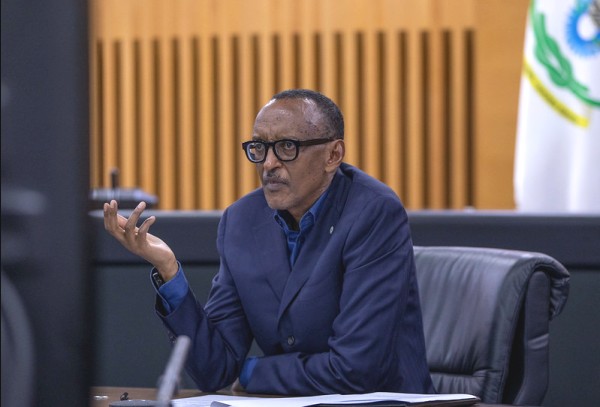
President Kagame yesterday participated in Africa-Europe Foundation Debate on Migration and Mobility, and with his experience as former refugee or migrant, and now leader, he focused on the imperative to correctly diagnose the root cause of migration. Read his intervention below:
I am very honoured to join you today for this timely discussion about migration and mobility.
Before I start my contribution, let me say I want to depart from two positions. I know there are many here in the audience who are maybe like me. One, the experience of being a refugee or a migrant.
And later on, also the responsibility of a leader in addressing some of these problems. I have had these two experiences. Therefore, my viewpoints are based even on personal sensitivities to this
matter.
I would like to take this opportunity to thank the Africa-Europe Foundation for facilitating this discussion ahead of the upcoming African Union-European Union Summit. Migration and mobility have long been at the forefront of the dialogue between Africa and Europe. There are several reasons as to the question raised by Mo Ibrahim on why Africans would migrate to Europe, some of them justified, others not. But they are either political, economic, security – all of that wrapped up in matters of governance.
In fact, if Africans, first of all, would be comfortable staying at home in their own countries and at the same time allowed to move from one country to another, then some of these problems could be reduced to the minimum. But the terms of the debate are broken. Dangerous journeys
continue to cause loss of life and empower criminal networks. We need new thinking, and actually action, to give us the results we want.
To make progress, we must correctly diagnose the root cause of migration. The most important driver is the imbalance in human capital opportunities between our continents, that is to say
between Europe and Africa.
Access to skills training, health care, and decent work may be unavailable, or the return on a person’s capabilities may be limited due to poor governance. An effective and humane migration
cooperation framework must be based on addressing the human capital investment gap.
The migration challenge is a shared responsibility for Africa, Europe, and multilateral agencies. All countries have the right to control their borders and regulate immigration. Settling in another
country, by anyone, is not an automatic entitlement.
There needs to be a better mechanism in place to distinguish between irregular migrants from relatively stable countries, and those deserving of special protection, who may get lost in the
crowd.
Similarly, obtaining refugee status should not be the only way to attain legal residence in destination countries. We also need to be doing a better job of engaging stakeholders on
all sides of the migration question, particularly the civil society and advocacy groups, which shape the political debate.
Overall, our starting point is that every young African should be able to lead a dignified, productive, and safe life on the African continent, whether in their home country, or elsewhere in Africa.
Recent African Union instruments expand the scope for mobility within Africa, particularly the African Continental Free Trade Area, and the Protocol on the Free Movement of Persons. Here I want to say, of the 55 countries on our continent, so few have signed this protocol to allow freedom of movement by Africans.
Wider access to digital skills and technologies is one of the most strategic ways to modernize the migration policy debate. It is no longer necessary to relocate to Europe in order to participate
directly in the European labour market, for example by supplying outsourced services to European clients. Young Africans can do so from Africa, with public-private technology investments that create jobs.
Multi-year partnerships between Africa and Europe can help address the migration challenge, both in humanitarian terms and more broadly.
One example is the Emergency Transit Mechanism established in Rwanda in 2018 – in fact, the discussion, and the offer, started in 2018 – in partnership with the African Union and UNHCR, to receive vulnerable migrants needing evacuation from Libya.
Partners in Europe have supported this initiative as well. More than 650 migrants have been welcomed and protected at this facility, while waiting resettlement processing. More comprehensive forms of migration cooperation are also under discussion with some other countries. However, policies focused on detention, deportation, and deterrence have not been effective, and will not provide a lasting solution. Therefore, we have to be thinking and acting differently.
Migration, in both directions, will continue to be a defining feature of the relationship between Africa and Europe for decades to come. It can be mutually beneficial, provided that it is orderly, safe, and focused on the needs and aspirations of each person. The best long-term approach is to work together to rectify the human capital gap that underlies the current crisis, while reaffirming
our obligation to provide protection and humanitarian assistance to those who need it.
Distinguished ladies and gentlemen, we can build on this. And as long as we work together and have honest and straight forward discussion, I think this problem is really not insurmountable.
And I am talking from experience, what we have already done, as I said earlier, rescuing these migrants from Libya. We had done another case with Israel. We are now discussing with other
countries. And I think, if we put our heads together, we shall find a solution. Thank you very much. (End)
